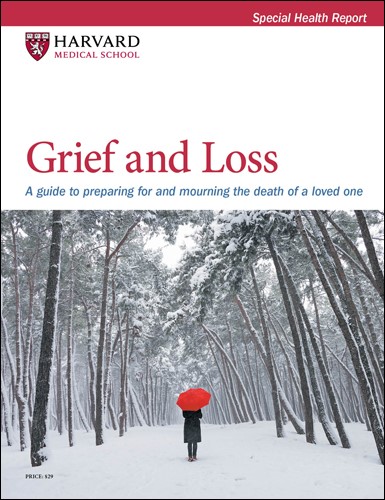Getting through grief
Prolonged grief disorder can emerge after someone close has passed away. Here's how to recognize the signs.

For many people, the pandemic has caused long and often incapacitating feelings of grief and mourning. This has led, in part, to the American Psychiatric Association (APA) recently adding prolonged grief disorder to its official list of mental disorders.
Prolonged grief disorder can develop when someone close to you has died within the past 12 months. You may experience intense longing for the deceased or preoccupation with thoughts about him or her. These feelings often occur most of the day, nearly every day, for at least a month.
The disorder doesn't have to involve the death of a loved one, either, according to the APA. It also can occur after traumatic events like natural disasters and mass shootings.
"Grief and mourning are an expected part of life, but professional help may be required when it lingers for weeks and months," says David H. Rosmarin, director of the spirituality and mental health program at Harvard-affiliated McLean Hospital.
See the signs
Prolonged grief disorder can affect people in different ways. Which symptoms people experience and the severity of each can vary. The following are the most common:
- identity disruption (feeling as though part of oneself has died)
- a marked sense of disbelief about the death
- avoidance of reminders that the person is dead
- intense emotional pain (anger, bitterness, sorrow) related to the death
- difficulty moving on with life, such as problems engaging with friends, pursuing interests, and planning for the future
- emotional numbness
- feeling that life is meaningless
- intense loneliness and feeling alone or detached from others.
If not addressed, prolonged grief disorder can, over time, flood the body with high amounts of cortisol (the stress hormone). Too much cortisol can raise blood pressure and increase blood sugar and cholesterol levels. Indirectly, prolonged grief disorder also can change your usual healthy habits.
"You may be less likely to exercise and get routine screenings," says Rosmarin. People with the disorder also are more likely to abuse alcohol and drugs. "If left untreated, your condition eventually can turn into more serious concerns, such as chronic depression," he says.
Talk it out
Men may be less likely than women to recognize the signs of prolonged grief disorder or act on them. This may be due to how the two sexes naturally approach grieving (see "Do men and women grieve differently?").
"It can be difficult for men to be honest with themselves and accept they may have trouble dealing with a loss," says Rosmarin. "But they need to understand that it's okay to give themselves permission to not be okay."
Talking about one's feelings can be challenging for men. Yet it's often the best way for men to confront their grief. "Getting it off your chest can be a great relief," says Rosmarin. "When people have prolonged grief disorder, they can't expect everything to get better without finding someone to talk with."
It can help to open up to a close friend or someone you trust, but not everyone feels comfortable doing so. In most cases, professional talk therapy is a better option. This involves sessions with a licensed psychologist, psychiatric nurse, counselor, social worker, or psychiatrist. "Therapy is a safe place where you can explore your feelings without worrying about being judged or feeling embarrassed," says Rosmarin.
Working with a professional can enable you to examine the depth of your grieving and how to begin healing. "And in many cases, you don't need long-term therapy," says Rosmarin. "A few sessions could be all that is necessary."
Going through this process also can prepare you for the next traumatic event. "Chances are you will be exposed again to something that may trigger prolonged grief disorder, but now you will be better able to cope," says Rosmarin.
Do men and women grieve differently?Another way the sexes are different? How they grieve. Research suggests that men are more likely than women to suffer in isolation when grieving. They often seek out distractions like work and are more susceptible to addictive and risk-taking behavior. Men also are more likely than women to commit suicide following the death of a spouse. This behavior may be related to the idea that admitting or showing grief is a form of weakness, says David H. Rosmarin, director of the spirituality and mental health program at Harvard-affiliated McLean Hospital. "Yet getting past this mindset and realizing you need assistance can help men deal with their grief before it worsens." |
Image: © /Getty Images
About the Author

Matthew Solan, Executive Editor, Harvard Men's Health Watch
Disclaimer:
As a service to our readers, Harvard Health Publishing provides access to our library of archived content. Please note the date of last review or update on all articles.
No content on this site, regardless of date, should ever be used as a substitute for direct medical advice from your doctor or other qualified clinician.
















